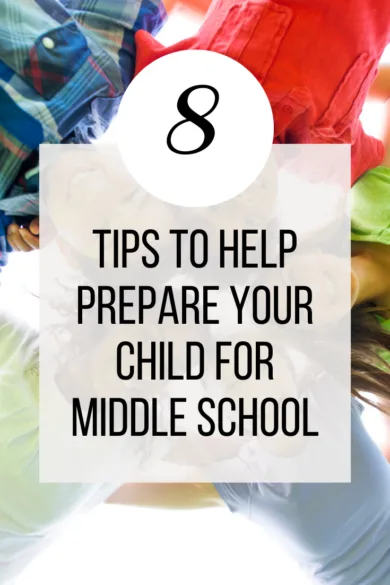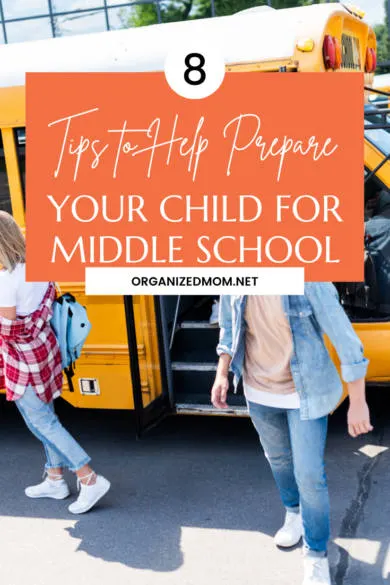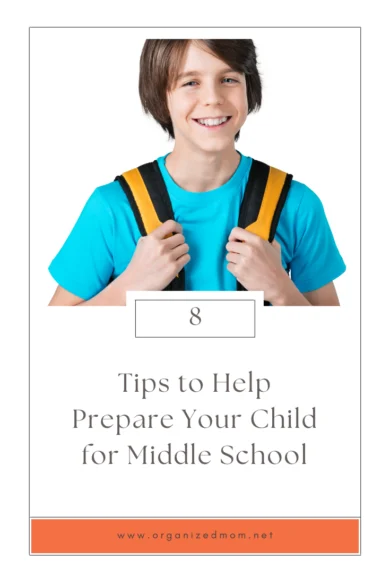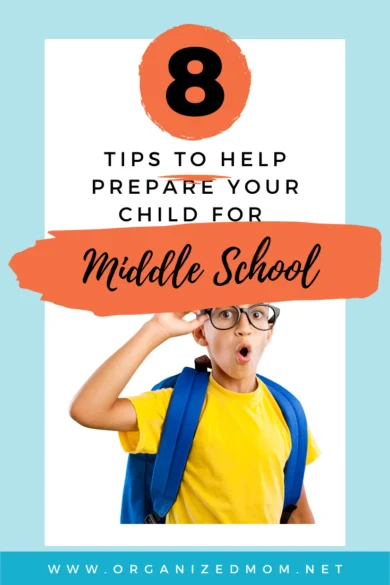Do you have a child who will be entering middle school this fall? The transition from elementary school to middle school can be a huge change. New middle schoolers have come from an environment of being the oldest in the school, to among the youngest, from having only one classroom teacher, to having many. Having a teacher lead them through the school, to having to navigate the halls on their own.
There are many differences between elementary and middle school, and these changes can feel overwhelming for a newly minted middle schooler. Especially if they are entering a large middle school.
Here are 8 tips to help prepare your child for middle school.
Ask about a preview day or a school tour.
One of the trickiest things during the first couple days of middle school is figuring out where your classes are in the school building and getting to them on time. It can be even more intimidating to try to figure out your schedule, if you have never set foot in the building before.
Often middle schools will offer a preview day for incoming 6th graders, but if yours doesn’t offer one, or if your kiddo happens to miss out on one, call the office and ask if they can give your child a quick school tour so they can become familiar with the layout of the school before their first day.
Find pictures of school staff on the school website.
If your school doesn’t offer a preview day where your child gets to meet their teachers in person before school starts, then try to find their pictures on the school site. You should have your kiddo’s schedule before the first day, so you can hop online to find pictures of your kid’s teachers. Being able to see a picture of their teachers and other school staff ahead of time can help anxious kiddos feel a little less nervous.
Talk to the school counselor or school psychologist about any specific concerns you have.
If your child has an individualized educational plan, or there or other specific concerns you have, don’t be afraid to contact the counselor or school psychologist before school starts with questions. Establishing a good relationship with those staff that will be working closely with your student is always a good idea.
Once school starts, make sure to check in routinely with teachers and staff on the IEP team during the first few weeks and months to make sure your child’s plan is in place and is fulfilling their needs.
Connect with neighborhood kids over the summer.
If you are new to the area, ask around to see if there are any neighborhood kids that will also be attending the same middle school. If your child has a chance to hang out with them before school starts, even better! It always helps to have a familiar face on that first day, or a friend they can walk into school with.
It can also help you meet other families in the neighborhood and get a carpool organized before school starts if your kids won’t be walking or riding the bus to school.
Find out about school technology policies and talk with your student about them before school starts.
If your child has a cell phone, it’s important that they know the school rules around the use of that technology and when/if it is allowed. Some of the biggest complaints I hear from my teacher friends is how prevalent cell phone use has become during class time. Each teacher might have their own policy, or there may be a school policy, but encourage your child to keep their cell phone put away and to only use it in case of an emergency or during appropriate times.
If chrome books or tablets are issued to students for use in class, have a chat with your child about using this as a learning tool and not for anything else. (Another complaint from my teacher friends.)
Get prepped for extracurriculars.
Will your child be in a sport? They might need to have a physical from the doctor before they can start practice. Will they be in the school band? Find out if the school will be supplying an instrument or if you will need to line up a rental. Once school starts, calendars fill up quickly so being able to check off some of these items before school starts can be helpful and make the start of the year less stressful.
Have some honest conversations with your kiddo prior to school starting.
Middle school is a time when your child may have their first encounter with their friends or other classmates making some not-so-great choices. Peer pressure seems to ramp up in middle school, and many tweens find themselves smack dab in the middle of it. It’s naïve to think there won’t be any kids experimenting with drugs, alcohol, and other risky behaviors, as sad as that reality is.
So seriously think about having some frank discussions about these things ahead of time. Some of these conversations can be quite uncomfortable, but establishing an open line of communication when they are just starting middle school will help them be able to open up to you about other important topics as they grow up. It’s never too early to start having these conversations.
Be an involved parent.
Figure out ways you can become involved at the school. Will your child be embarrassed by your involvement? Maybe. But becoming involved and getting to know what is happening at the school (both good and bad) can aid you in helping your child navigate this unique time in their lives. Schools are always looking for volunteers, and if you have the time, it’s a great way to stay plugged in.
The middle school transition can be challenging for both parents and kids. I hope this article has given you some ideas for making this transition a bit easier for everyone. Here’s hoping you and your child have a great year!







